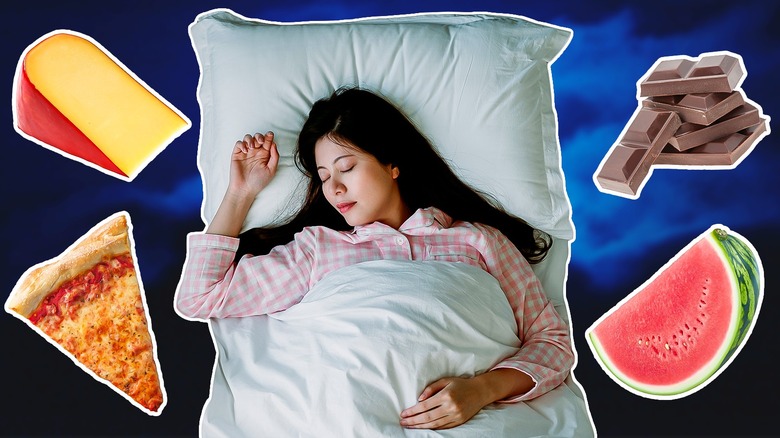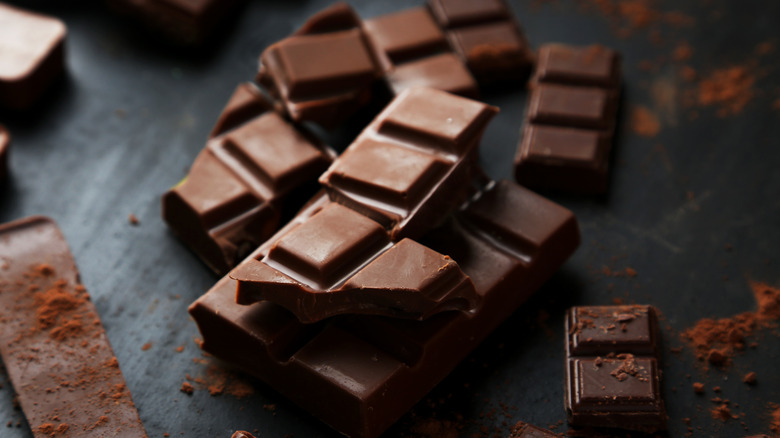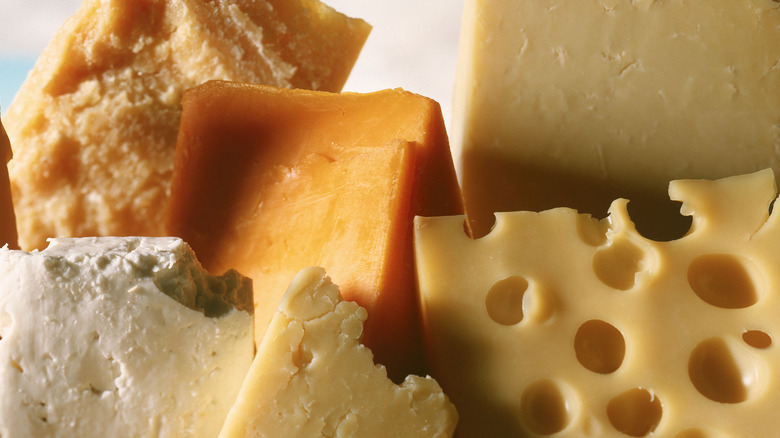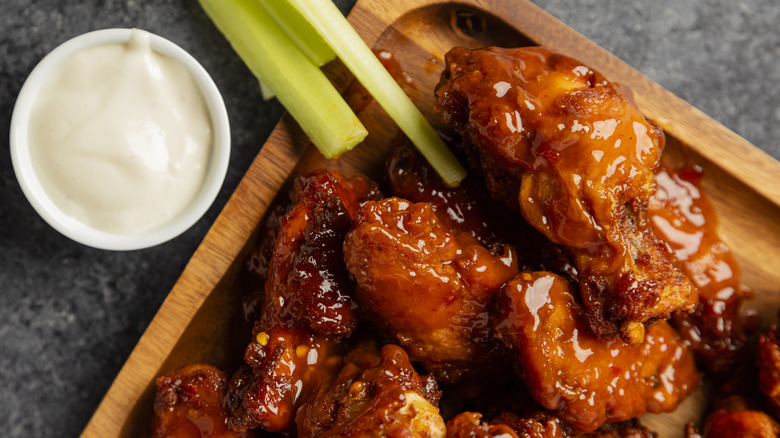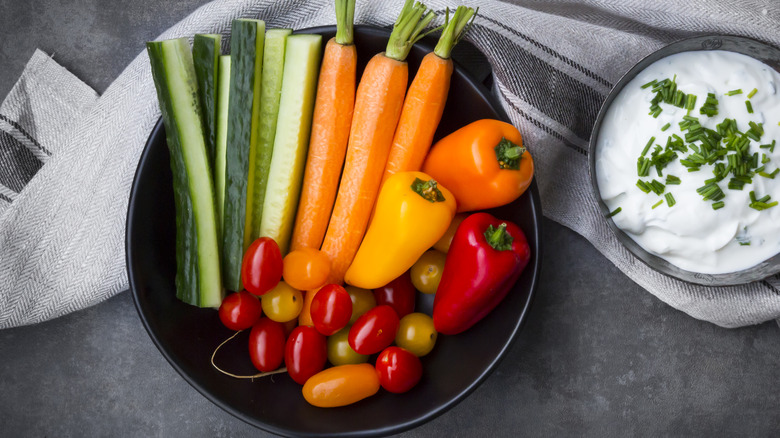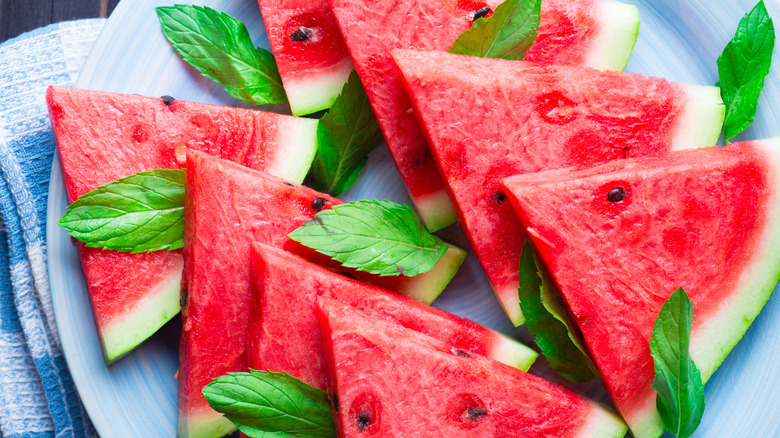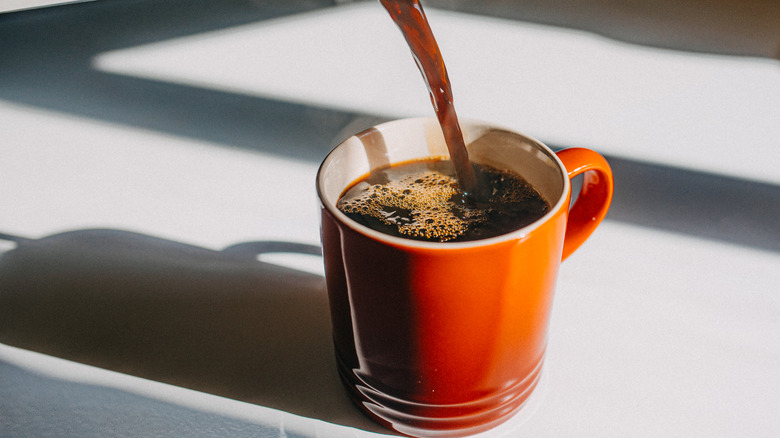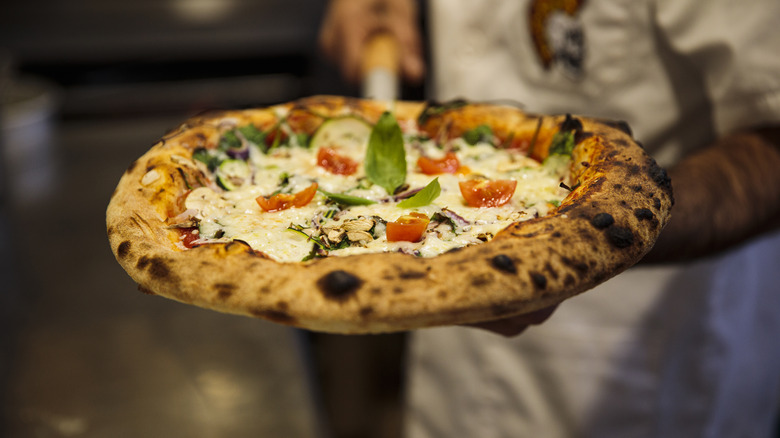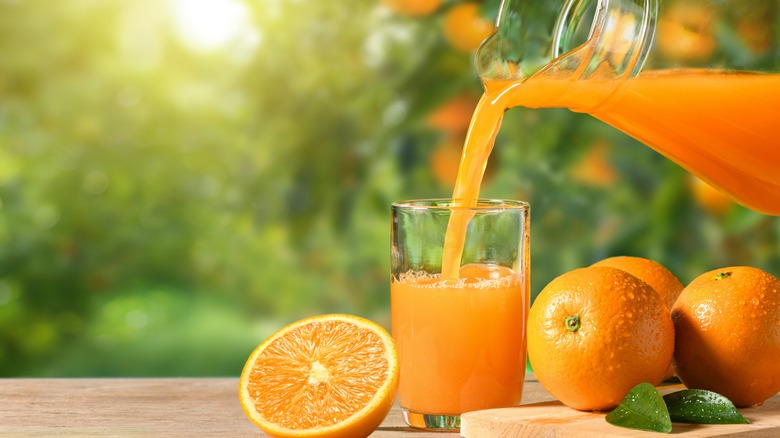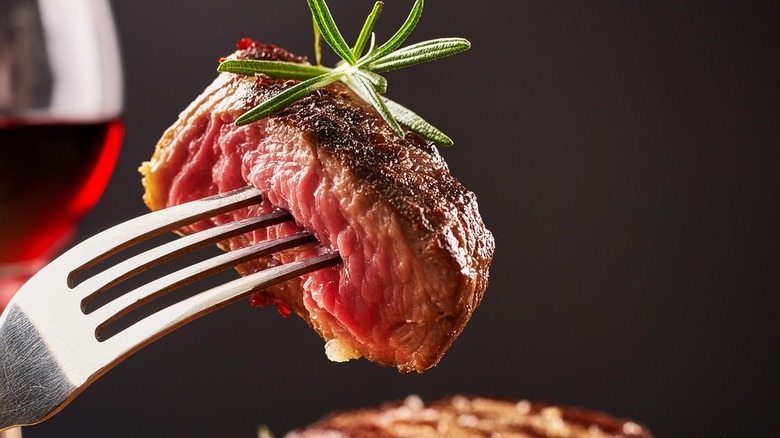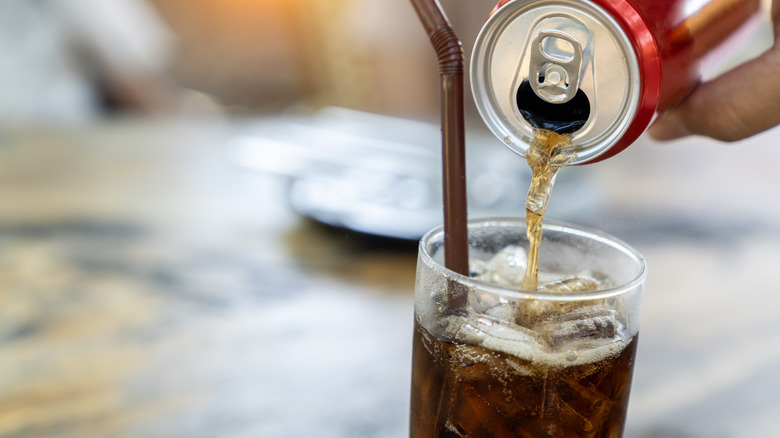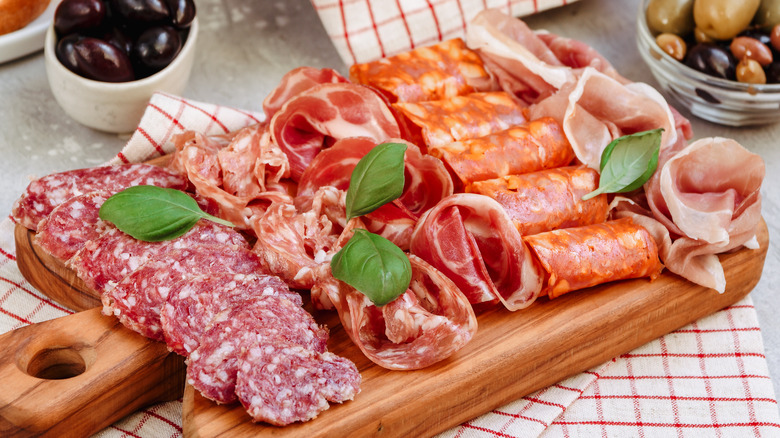The 12 Worst Foods To Eat Before Bed
Every person needs sleep to function, but getting good sleep isn't always easy. Between constantly staring at our phones and computers and the stressors we deal with at work and at home, reaching the doctor-recommended 7 hours of nightly sleep can feel like an impossible task. Even simply putting yourself to bed can be difficult; many adults need several hours in bed to decompress before drifting off into the land of nod.
And while a glass of wine or a bite of your favorite chocolate bar may be calling your name, unfortunately, a pre-bed or midnight snack isn't usually the best solution. Since sleep is such an important bodily process, it makes sense that the foods and beverages we eat and drink before bed can have a major impact on our sleep quality. Too much salt, caffeine, sugar, fiber, or acid can make it extremely tough to catch those zzz's, and less restful sleep may lead to health issues and other problems down the road. To ensure that you get the best sleep, make sure to avoid or limit these foods before bedtime.
Chocolate
Chocolate, with its many different brands and varieties, contain two things that can greatly impact your restfulness: Sugar and caffeine. Caffeine is present in cacao, from which chocolate is made. Darker chocolates tend to have a higher percentage of cacao, and therefore, more caffeine. For example, a small bar of dark chocolate could have up to 150 milligrams of caffeine. By comparison, a short, or 8 fluid ounce cup of Blonde roast from Starbucks, has about 180 milligrams of caffeine. So while it isn't quite like drinking a cup of coffee, having an entire dark chocolate bar could affect your ability to sleep. The good news is that you can add dark chocolate to your next baking project, as it contains good-for-you minerals like selenium and magnesium.
Chocolate bars with a lower cacao percentage (such as milk chocolates) may give you less caffeine, but it contains more sugar, milk, and oftentimes vanilla and other additives. So while you may not suffer the consequences of caffeine, you may get a bit of a sugar high, resulting in not-so-great sleep. White chocolate also contains high levels of sugar, cacao butter but no actual cacao, so these two are best skipped or only eaten in very low quantities away from bedtime.
Cheese
Liz Lemon may be workin' on her night cheese, but you probably shouldn't if you want a good, restful sleep. Certain varieties of cheese may possibly impact your sleep by inducing strange, lucid dreams. According to a 2005 study by the British Cheese Board, certain varieties of cheeses, including blue and cheddar, caused vivid dreams in participants. But dreams aside, cheese can also be disruptive to sleep due to its chemical makeup.
Certain types of aged cheese such as Gorgonzola, Parmesan, Asiago, and fontina have high levels of tyramine. Tyramine is an amino acid that is a good source of protein, but it also stimulates the brain and, thus, can make it difficult to fall asleep. We've all had nights when we simply couldn't turn our brains off, and cheese makes doing so even more difficult. It can also elevate your heart rate and may trigger migraines. Plus, the high lactose content in cheese could upset the stomachs of those with sensitivities, potentially leading to gas and diarrhea. If you're determined to have cheese before bed, stick with small quantities of fresher, less aged varieties like mozzarella and farmers' cheeses which are less likely to keep you awake.
Spicy foods
A bowl of chips and salsa before bedtime may not be the way to go, nor are hot wings, curries, or other spicy items. Even if you are a self-proclaimed chili head, trying to increase your spice tolerance right before you go to sleep could disrupt it in a big way. Capsaicin, the chemical present in spicy foods, can disturb your body's ability to regulate temperature. Once that happens, the chances of getting a deep, restful sleep are out the window.
Spicy foods can also disrupt sleep due to their ability to cause intestinal discomfort. Foods with high levels of capsaicin can cause your body to produce more acid, causing heartburn, gas, and possibly diarrhea. Once you lay down, the acid can rise in your throat, burning your esophagus and causing pain. Some people may feel the effects worse than others, but if you have a big bowl of spicy Indian curry and then lay down an hour later, chances are you're going to have some trouble.
Raw vegetables
It may seem a little counterintuitive but eating too many raw vegetables just before getting into your pajamas and snuggling up in bed can actually affect your sleep. While certain sliced vegetables, such as cucumbers and asparagus, may be better than broccoli and cauliflower, it's generally best to avoid the crudité platter altogether.
Some nutritionists say that eating a bunch of vegetables before bed forces your body to work through digesting them, which can take a while when it comes to something high in fiber like vegetables. Even the tryptophan present in vegetables (the same chemical present in your Thanksgiving turkey that makes you super tired) can't combat your stomach working overtime to break down the large amounts of insoluble fiber present in cruciferous vegetables. So have your dinner salad or dinner veggies but be sure to keep them on your plate several hours before bedtime to allow enough time for them to digest.
Watermelon
The bright red, juicy, summer staple is as at home on a picnic table as it is on an after-dinner granita. Picking out the best, most luscious watermelon is a feat to be proud of, and working this fruit into everything from salads to desserts becomes par for the course when they're in season. But no matter how you use up leftover watermelon, it may not be the best choice.
As its name implies, watermelon is full of water. Therefore, chowing down on a big bowl of this juicy fruit right before bed could mean your sleep is about to be interrupted by numerous trips to the bathroom. Another reason that watermelon may not be ideal right before bedtime is its sugar content. One slice of watermelon can clock in with about 17 grams of sugar. While it's less than a mango, it's still high enough that the sweetness coupled with the water content may keep you up unintentionally. A little hydration boost isn't too big of a deal during our waking hours. But at night, it could prevent you from falling asleep when you really want and need to.
Coffee
Not surprisingly, the drink that helps you wake up isn't the best when used as a nightcap. Coffee, whether black, with cream and sugar, or with alternative milk, contains caffeine, which is notorious for keeping you awake at night. Caffeine naturally occurs in coffee beans, frozen or otherwise, and can affect you for anywhere from two to 10 hours after you've finished your last cup. And although the average 8-ounce cup of coffee usually has between 80 to 100 milligrams of caffeine, the amount can vary due to a variety of factors, including the beans, the roast, and how strong you've made your coffee.
If you're itching for something warm and cozy that'll keep you a bit alert after dinner, try a cup of mushroom coffee, which doesn't have the same amount of caffeine or stimulants that regular coffee does. You could also go with a cup of decaffeinated tea or a cup of warm milk to relax. Keep in mind that whatever you add to your coffee — cream, sugar, or milk — it can also play a part in keeping you awake or not.
Pizza
It can be tempting to end an evening with your girlfriends over a local pizza crowned with everything from pepperoni to mushrooms to peppers to extra cheese then crawl into bed with a stomach filled with cheesy carbs. However, pizza should not be in your docket of "things to eat" right before bedtime. More often than not, indulging in the cheese and sauce vehicle results in pretty bad heartburn, indigestion, and discomfort.
Pizza is made up of several items that, in and of themselves, aren't great for sleep. By now, you know that cheese is full of tyramine that can keep you alert even after you've laid down for the evening. But tomato sauce, though full of vitamins A, C, and K, is also highly acidic and the introduction of more acid into your gut and then lying down is a recipe for heartburn. Even the crust of your pizza could be hurting your chances for a restful sleep, since your body has to work to break them down.
Citrus juices
Due to their acidic nature, the juice from fruits such as oranges, tangerines, and grapefruits could lead to some extreme discomfort and potentially kick off a heartburn. Citrus fruits can churn up and cause your body to produce more stomach acid. As soon as you lay down, that acid may splash its way up into your esophagus, bringing on the horrible sensation we know as heartburn.
Chugging a glass of citrus juice isn't any better on a full or empty stomach, either. A full stomach may help absorb some of the juice, but more food in your tummy means your gut is working harder to break it down, thereby producing more acid. Having a glass of lemonade or orange juice on an empty stomach, though, is introducing acid and sugar with nothing to soak it up. If you're craving a glass of OJ, try enjoying it during the day instead.
Red meat
A big, juicy medium rare ribeye, a fat, stacked burger, or a shredded Italian beef all make for a filling and classic meal. But even with meat alternatives such as Impossible burgers and meats, a big porterhouse steak or bowl of pot roast smothered in gravy are common in American households. However, all that red meat could be adversely affecting sleep patterns and restful habits.
Red meat has two amino acids — tryptophan and tyrosine. The former makes you sleepy; the latter keeps your brain alert. But red meat also contains other amino acids which may force these two to take a backseat, leading to less body clock regulation and, therefore, less quality sleep. In a recent study in Aging & Disease Journal, older adults who included large quantities of red meat in their diet had less restful sleep than those that ate less red meat. Instead, lean toward a more Mediterranean diet with lots of vegetables, fruits, grains, and lean proteins for a better night's sleep.
Soda
Are you a Diet Coke fiend? Do you worship a tall, frosty glass of bubbly Sprite before bed? How about a bit of Cheerwine for our friends in the Southeast? Regardless of which soda you love, you may want to curb the habit before bedtime for a variety of reasons.
First, most sodas are chock-full of sugar and artificial flavorings. Sugar can greatly disrupt our sleep patterns in several ways, including by lessening slow-wave sleep, which helps our bodies recover at the end of the day. Additionally, spikes in blood sugar can cause us to wake up throughout the night, lessening the time we spend in deep, restful dreamland. Aside from the sugar content, many sodas, including Coca-Cola, Pepsi, Dr. Pepper, and Mountain Dew, contain caffeine. As we already well know, caffeine makes falling asleep a bit more difficult. For sleep's sake, try swapping out your soda for something like an all-natural seltzer with a bit of lemon instead.
Charcuterie
For those of us who grew up on Lunchables, charcuterie is the logical next step in our culinary adventures. A plank with cheeses, jams, cured meats, and pickled things? Sign us up. But although the charcuterie board is a mainstay at many millennial parties, it's not the best thing to eat before you curl up in your pajamas for the night.
Cured and smoked meats, like the prosciutto, salami, and soppressata that you may find on a charcuterie board, contain tyramine. Additionally, cured and smoked meats contain high levels of salt and preservatives and were declared carcinogenic to humans in 2015, according to the World Health Organization, making them about as bad for you as cigarettes when consumed in excess. So if you're craving a bit of that charcuterie board that your friend put together for Bachelor Monday, limit yourself to a few bites and be mindful of what you're eating.
Alcohol
Alcohol usage comes with its own set of problems when it comes to a restful sleep. Sure, a nice glass of red, white, or a spiced up rosé with dinner isn't necessarily an issue in itself. But prolonged use could lead to sleep issues and even insomnia, amongst other issues.
Research published in the Korean Journal of Family Medicine has shown that our sleep cycles can be disrupted by alcohol consumption, especially in the rapid eye movement, or REM, stage. REM is the fourth stage of sleep in which scientists believe long-term memory storage occurs and when our dreams take place. You may initially get more non-REM sleep after having a few drinks (since alcohol is a somnogen and makes us sleepy), but you'll get less REM, or deep sleep. You may wake more often and feel significantly less rested, and you may begin to feel the effects including stress, anxiety, and fatigue. While a glass of wine or a bit of Scotch isn't an issue, going overboard and making it a habit can have long term implications.
